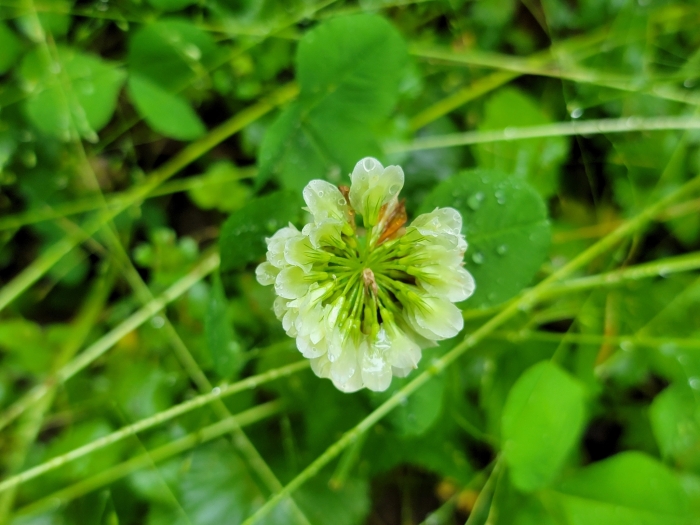Running Buffalo Clover
(Trifolium stoloniferum)
Running Buffalo Clover (Trifolium stoloniferum)
/
/

Elias
CC BY 4.0
Image By:
Elias
Recorded By:
Copyright:
CC BY 4.0
Copyright Notice:
Photo by: Elias | License Type: CC BY 4.0 | License URL: http://creativecommons.org/licenses/by/4.0/ | Rights Holder: Elias | Publisher: iNaturalist | Date Created: 2021-05-26T19:37:27-07:00 |
























Estimated Native Range
Summary
Trifolium stoloniferum, commonly known as Running Buffalo Clover, is an endangered perennial herb native to the United States. It was once thought extinct until rediscovered in 1985. This clover thrives in mesic to dry-mesic conditions, primarily in open woodlands, grassy clearings, and along stream banks. It is also found in disturbed areas that mimic historical grazing grounds, such as old fields and lawns. Running Buffalo Clover typically grows to a height of 6-12 inches (15-30 cm) and spreads via stolons, which are horizontal above-ground stems that root at the nodes to form new plants.
The plant is characterized by its trifoliate leaves and small, white flowers that bloom from mid-May to June. The flowers are arranged in compact, spherical heads and are attractive to pollinators. In cultivation, Running Buffalo Clover can be used for prairie restoration, wildlife gardens, and as a ground cover in appropriate settings. It prefers partial shade but can tolerate full sun if moisture is adequate. It requires well-drained soils with a neutral to slightly acidic pH. While it does not form a typical rhizobial association, it can benefit from soil that is not overly rich in nitrogen. Due to its endangered status, cultivation should be approached with conservation in mind, and sourcing plants from reputable nurseries is essential.CC BY-SA 4.0
The plant is characterized by its trifoliate leaves and small, white flowers that bloom from mid-May to June. The flowers are arranged in compact, spherical heads and are attractive to pollinators. In cultivation, Running Buffalo Clover can be used for prairie restoration, wildlife gardens, and as a ground cover in appropriate settings. It prefers partial shade but can tolerate full sun if moisture is adequate. It requires well-drained soils with a neutral to slightly acidic pH. While it does not form a typical rhizobial association, it can benefit from soil that is not overly rich in nitrogen. Due to its endangered status, cultivation should be approached with conservation in mind, and sourcing plants from reputable nurseries is essential.CC BY-SA 4.0
Plant Description
- Plant Type: Herb
- Height: 0.5-1 feet
- Width: 1-2 feet
- Growth Rate: Slow, Moderate
- Flower Color: Pink, White
- Flowering Season: Spring, Summer, Fall
- Leaf Retention: Deciduous
Growth Requirements
- Sun: Full Sun
- Water: Medium
- Drainage: Medium, Fast
Common Uses
Bee Garden, Butterfly Garden, Low Maintenance
Natural Habitat
Mesic to dry-mesic open woodlands, grassy clearings, and stream banks
Other Names
Common Names: White Clover, Stoloniferous Clover
Scientific Names: , Trifolium stoloniferum, Trifolium stoloniferum,
GBIF Accepted Name: